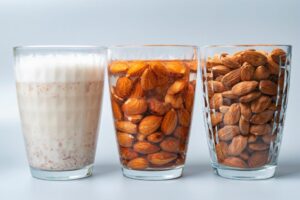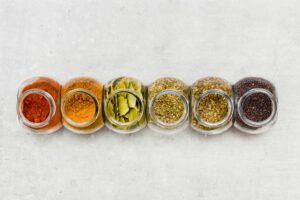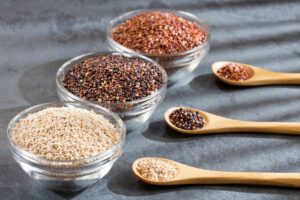Is your bloated stomach causing problems for you on a daily basis? Nutritionist Rob Hobson reveals what causes bloating and 9 ways we can help to relieve symptoms
There are many reasons to explain why you may be experience a bloated stomach.
Indeed, a recent survey by Healthily – a self-care platform that provides medically validated healthcare advice – looking at gut health problems found over two-thirds (66.6%) of the 500 women questioned said bloating was a big problem for them and had a negative impact on their lives.
Healthista spoke to Rob Hobson, Head of Nutrition at Healthspan who explains exactly what we need to know about what causes a bloated stomach and what we can do to help relieve symptoms…
What does bloating feel like?
We have all felt the uncomfortable sensation of bloating. Bloating is very common, and research shows that around 16-30 per cent of people experience it on a regular basis.
Women appear to experience bloated stomach symptoms more than men, which may be explained by hormone status. However, men seem less likely to report symptoms of bloating or seek help for them.
around 16-30 per cent of people experience it on a regular basis
This feeling stems from a sense of fullness alongside symptoms such as a swollen belly.
Explosive releases of gas either upward (burping) or downward (passing wind) are often experienced alongside the burbling, abdominal pain, distension, and embarrassing noises associated with trapped wind or bloating known as borborygmi.
READ MORE: Bloated? Constipated? 7 signs you’re stuck in a fibre gap

What are the most common causes of bloating?
Diet plays a role, and certain foods can encourage bloating, such as beans, pulses, lentils, and certain vegetables. These foods are high in fibre, and a sudden increase is typical amongst those adopting a more plant-based approach to eating.
The bloated stomach effect associated with an increased fibre intake subsides typically as the body becomes accustomed to it. Increasing your fluid intake is essential as this helps fibre swell in the gut and do its job correctly.
Stress and anxiety can also impact bloating
Eating behaviour can also influence bloating, such as eating on the go or eating too quickly. Stress and anxiety can also impact bloating, as can food intolerances.
Professor Maureen Baker from Healthily Smart Symptom Checker adds, ‘If your bloated stomach persists for more than two weeks or keeps coming back then it is important to see your doctor to rule out any other cause.’
READ MORE: Is bloating and flatulence ruining your sex life?
What foods are synonymous with bloating when following a plant-based diet?
Food high in FODMAPS commonly causes bloating. These foods contain short-chain carbohydrates that pass straight through to the colon, where they’re left to be fermented by gut bacteria which is a process that produces excess gas.
High FODMAP foods include:
- Garlic, onion, mushrooms, artichokes, cruciferous vegetables (e.g., cauliflower, broccoli, cabbage, kale)
- Apples
- Beans, pulses, and lentils, nuts, wheat, barley, and rye and soy foods
A diet high in veggies can also cause bloating
Making changes to your diet, such as moving over to a more plant-based diet can be a cause of bloating.
Whether you have decided to go vegan or just increase your intake of plant-based foods and eat less meat, one of the most common side effects in the beginning, is bloating and wind.
the increase in plant foods may lead to bloating
This effect may be short-lived as your body adapts, but in some cases, adjustments to the diet may be required to help alleviate such effects.
Switching to a plant-based diet in whatever form it takes is hugely healthy, but in the first instance, the increase in plant foods may lead to bloating. Don’t let this deter you. There are many ways to help your body adapt to this way of eating and other everyday ways to tackle bloating.
READ MORE: Why am I bloated? How hormones affect digestion plus what you can do about it
Those new to a veggie diet in any form can often fall into the trap of relying on processed foods or limiting their diet to very few foods which may stem from a lack of knowledge in preparing vegetarian meals.
Processed foods like breaded products and in the case of vegetarians an excessive intake of foods like pasta and cheese may cause bloating in some people.
Anyone adopting a plant-based diet of any description needs to follow a varied diet to ensure they are getting adequate nutrients to support their health. This may involve a little more cooking and food preparation.
Still, there are lots of quick, simple and nutritious recipe ideas available online.

Eight ways to help reduce the risk of a bloated stomach on a veggie diet
Whether you are going flexi, veggie, or full-on vegan, there are many ways in which you can try to lessen the effect of bloating.
#1 Leave your beans to soak overnight and cook with seaweed or bay leaves
If you are using dried beans, leave them to soak overnight before cooking them. This process helps to break down the complex sugars that can cause bloating.
Canned beans have effectively undergone the soaking process, so they are always a better option and more convenient.
Another tip if you use dried beans (after soaking) is to add seaweed or bay leaves to the cooking water. The enzymes they contain can help break down indigestible sugars.
#2 Pick your lentils wisely
Lentils are hugely healthy, and the minerals they contain (calcium, magnesium, iron) and protein make them a valuable addition to a plant-based diet.
try opting for lighter coloured varieties such as red lentils over brown or green
Their high fibre content can exacerbate bloating but amounts of this nutrient vary amongst the different types of lentils. If you are struggling with bloating, try opting for lighter coloured varieties such as red lentils over brown or green which are higher in fibre.
#3 Soak your nuts and seeds too
Some foods, including nuts and seeds, contain phytic acid or phytates, the stored form of phosphorus in plant foods. Other foods high in phytates include lentils, raw bran and certain dark green leafy vegetables such as spinach.
These compounds act as enzyme inhibitors interfering with digestion, encouraging bloating and limiting the absorption of minerals such as iron, zinc, and calcium. Their effect on mineral absorption can be overcome by including plenty of foods rich in such vital minerals.
Soaking nuts and seeds or sprouting them is a helpful way to reduce the phytate content making them more easily digested.

#4 Limit your intake of cruciferous vegetables
Cruciferous vegetables include broccoli, cabbage, and cauliflower. We are probably all familiar with the ‘windy’ effect they can have on us.
These foods can lead to bloating because we don’t possess the enzyme required to break down a complex sugar called raffinose, which is then left to ferment in the gut and contribute to excess gas.
Cruciferous vegetables are incredibly healthy and contain a more comprehensive range of nutrients, especially minerals, compared to other vegetables.
Don’t cut them out of your diet. Limit them to start with, then build up your intake over time if bloating is an issue.
#5 Try drinking herbal teas
Herbs such as mint and seeds such as caraway and fennel can help to alleviate excess gas after eating. This helps by loosening the ‘valve’ that connects your stomach to your oesophagus, helping to expel unwanted gas from the stomach.
You can brew a simple tea by adding fresh mint, caraway, and fennel seeds to a teapot with boiling water.
This helps by loosening the ‘valve’ that connects your stomach to your oesophagus
Don’t confuse bloating with heartburn, as the effect of this tea will exacerbate reflux allowing it to enter the oesophagus more easily.
#6 Swap onions for fresh herbs or spices
Onions are a very common ‘bloating’ vegetable as they are one of the primary dietary sources of fructans which can cause bloating in some people.
Raw onions may cause more issues in some people, so start by always cooking them. Onions are a key ingredient in most savoury recipes.
However, if you still struggle with a bloated stomach, then onions can easily be replaced with flavourful herbs and spices.

#7 Limit your intake of raw vegetables
Raw vegetables are often touted as more nutritious. Still, they can exacerbate bloating as they are more difficult to digest than cooked. Cooking vegetables can help start the breakdown of these foods, making them easier to digest.
On a side note. Certain compounds in foods, such as the carotenoids (antioxidant compounds) found in red and orange foods, are made more available after cooking.
Cooking vegetables can help start the breakdown of these foods, making them easier to digest
How you cook and how long for can also make a difference. For example, lightly steaming or stir-frying can help to preserve the number of water-soluble nutrients in foods such as vitamins B and C and if you do eat raw foods try not to eat them after 4pm.
#8 Try swapping whole grains for white varieties or pseudo-grains
Some people find that whole grains such as brown rice, barley, or spelt can be quite bloating. While these grains are a good source of fibre, there is no harm in switching to grains such as white rice.
You will naturally be increasing your overall fibre intake by following a plant-based diet with the inclusion of more legumes, vegetables, nuts, and seeds.
Pseudo-grains are another option that may be less bloating. These are derived from seeds and include quinoa and buckwheat and are a little easier to digest for some people and may help ease bloating.

#9 Eat mindfully
Watch how you eat. Adopt a mindful approach to eating by setting time aside to sit down and eat.
Chew your food properly to maximise digestive enzyme production and take your time by putting your cutlery down between mouthfuls.
Is there anything else you can do to help prevent a bloated stomach?
Adopting a veggie diet healthily should entail an increased intake of foods high in fibre. Still, you may want to do this slowly to lessen the risk of bloating while also drinking more water (it helps fibre swell in the gut).
It’s a misconception that a plant-based diet in whatever form is healthier than an omnivore one.
The plant-based food landscape has changed dramatically over the last decade. It is now very easy to be an unhealthy vegetarian or vegan. This is due mainly to the increased availability of high sugar and bad fats in processed foods.
It is now very easy to be an unhealthy vegetarian or vegan
An unhealthy diet rich in sugar and bad fats may take its toll on your gut health, as can cutting out too many food groups. Always stick to the basic principles of healthy eating when planning your meals.
Probiotic foods (yoghurt, kimchi, kefir) are always an excellent option to help keep your gut healthy, as are supplements – try Healthspan Super20 Pro, £17.95 – or a multivitamin to support you tailored for vegan and vegetarians.
Like this article? Sign up to our newsletter to get more articles like this delivered straight to your inbox.





















































